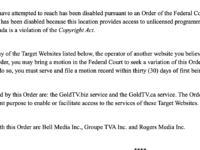Last week I wrote about a federal court ruling that opened the door to copyright website blocking in Canada without Parliament establishing site blocking rules or the involvement of the CRTC. The decision is flawed from both a policy and legal perspective, substituting the views of one judge over Parliament’s judgment and relying on a foreign copyright case that was rendered under markedly different legal rules than those found in Canada. I concluded by noting that the case should be appealed and just over a week later, TekSavvy, the independent ISP that stood alone in contesting the blocking order, did just that. Even as the appeal was launched, however, the major Canadian ISPs began blocking access to the specific webpages identified in the court order.
Archive for November 26th, 2019

Law Bytes
Episode 210: Meredith Lilly on the Trade Risks Behind Canada’s Digital Services Tax and Mandated Streaming Payments
byMichael Geist

July 15, 2024
Michael Geist
June 24, 2024
Michael Geist
Search Results placeholder
Recent Posts
 The Law Bytes Podcast, Episode 210: Meredith Lilly on the Trade Risks Behind Canada’s Digital Services Tax and Mandated Streaming Payments
The Law Bytes Podcast, Episode 210: Meredith Lilly on the Trade Risks Behind Canada’s Digital Services Tax and Mandated Streaming Payments  Abandoning Institutional Neutrality: Why the University of Windsor Encampment Agreements Constrain Academic Freedom and Freedom of Expression
Abandoning Institutional Neutrality: Why the University of Windsor Encampment Agreements Constrain Academic Freedom and Freedom of Expression  The Law Bytes Podcast, Episode 209: Peter Menzies on Why the Canadian News Sector is Broken and How to Fix It
The Law Bytes Podcast, Episode 209: Peter Menzies on Why the Canadian News Sector is Broken and How to Fix It  Why the University of Windsor Encampment Agreement Violates Antisemitism and Academic Freedom Standards
Why the University of Windsor Encampment Agreement Violates Antisemitism and Academic Freedom Standards  Know When to Fold Em: The Big Risk Behind Canada’s Digital Services Tax Bet
Know When to Fold Em: The Big Risk Behind Canada’s Digital Services Tax Bet

